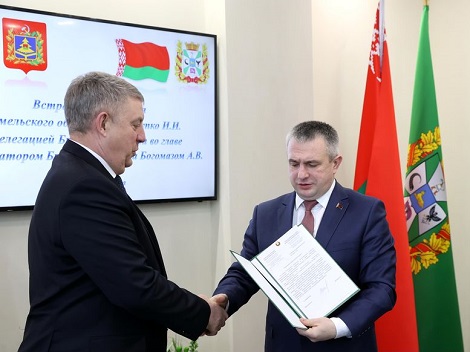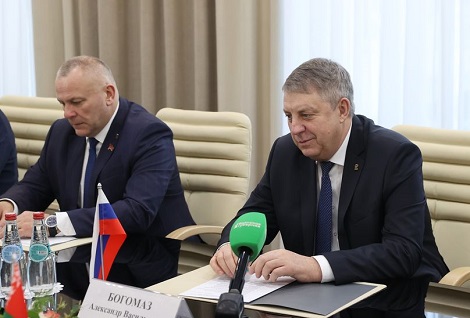Business news
Belarus’ Gomel Oblast, Russia’s Bryansk Oblast to expand cooperation

GOMEL, 31 January (BelTA) - Prospects for further expansion of cooperation between Gomel Oblast of Belarus and Bryansk Oblast of Russia were discussed at the meeting of Gomel Oblast Governor Ivan Krupko and the delegation of Bryansk Oblast led by Governor Alexander Bogomaz on 31 January, BelTA has learned.
According to Ivan Krupko, the relations between the two regions has reached a qualitatively new level in recent years. Partnership in all sectors of life has been expanded. “This is an example of cooperation between the regions of Belarus and Russia,” the governor said. He also believes that the partnership of the two regions makes a significant contribution to the construction of the Union State.
The governor is convinced that the parties need to make a revision in all areas, look at available resources to find new impulses to expand the partnership. “The agro-industrial complex of Bryansk Oblast has been rapidly developing. We have something to offer in this area,” Ivan Krupko emphasized.

The parties agreed that joint work on increasing production at Bryanskselmash will contribute to higher mutual trade.
In the construction sector, design and construction organizations of Gomel Oblast are ready to participate in housing construction, implementation of road-building and agricultural projects, supply building materials to Bryansk Oblast, Ivan Krupko said.
Alexander Bogomaz spoke about plans to build swimming pools and ice arenas in Bryansk Oblast. He suggested considering the possibility for Gomel builders to take part in these projects.
Alexander Bogomaz mentioned the goal to increase the trade between Belarus and Bryansk Oblast up to $1 billion. “Our main partner in the Republic of Belarus is Gomel Oblast,” the governor emphasized.

The parties said that apart from the cooperation of economic blocks and business interaction, the regions have been strengthening ties in culture, sports, education, and youth policy. According to Alexander Bogomaz, it is important for the new generations to continue the established traditions and do their best for the further development of their regions and countries.







 print version
print version make home page
make home page add to bookmarks
add to bookmarks

